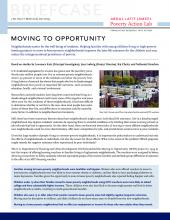Moving to Opportunity
Neighborhoods matter for the well-being of residents. Helping families with young children living in high-poverty housing projects to move to lower-poverty neighborhoods improves the later-life outcomes for the children and may reduce the intergenerational persistence of poverty.
Key Takeaways
- Families moving to lower-poverty neighborhoods were healthier and happier. Women who were offered vouchers to move to lower-poverty neighborhoods were less likely to have extreme obesity or diabetes, and less likely to have psychological distress or major depression. Families given the opportunity to move to lower-poverty neighborhoods also reported feeling happier and safer.
- Children under 13 when their families moved to lower-poverty neighborhoods using MTO vouchers were more likely to attend college and have substantially higher incomes. These children were also less likely to become single parents and lived in better neighborhoods as adults, resulting in multi-generational benefits.
- Children who were 13 or older when their parents moved to lower-poverty areas had slightly negative long-term outcomes.
- Moving may be disruptive to children, and older children do not have many years to benefit from the new neighborhoods. Moving to a lower-poverty neighborhood had no effect on employment or income for those who were adults when they moved.
